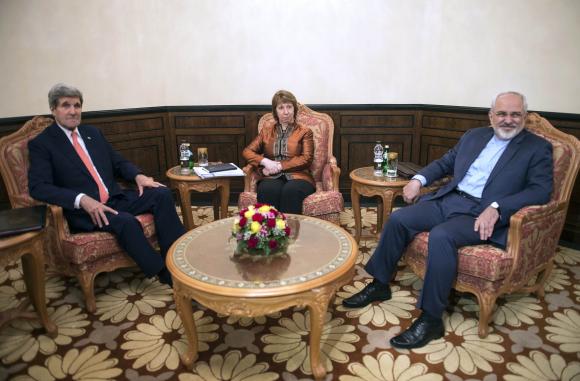The U.S. Secretary of State said Saturday that the U.S. has no intention to extend the deadline of the nuclear talks, which is currently set for March 31 2015, and is ready to pull out of the negotiations table.
John Kerry told a press conference on Saturday at the U.S. embassy in London that "there are still significant gaps, there is still a distance to travel," and that the United States may pull out of the talks because of "substantial differences of opinion."
"President Barack Obama has no inclination whatsoever to extend these talks beyond the period that has been set out," Kerry said, adding that Obama "is fully prepared to stop these talks if he feels that they are not being met with the kind of productive decision-making necessary to prove that a program is in fact peaceful."
Kerry said that there was no "divergence whatsoever in what we believe is necessary for Iran to prove that its nuclear program is going to be peaceful."
An Iranian official on Friday said that Iran is pursuing changes to accelerate nuclear negotiations, where topics are handled in details.
"We are pursuing changes in the procedures of the negotiations to accelerate the nuclear talks," said Abbas Araghchi, Iran's chief nuclear negotiator, according to Iranian television.
Kerry will fly from London on Sunday to Geneva to meet the meet the Iranian delegation including Iran’s Atomic Energy Authority President Ali Akbar Salehi, Foreign Minister Mohammad Javad Zarif and President Hassan Rouhani's brother, Hossein Fereydoun.
Iran and the world powers group called the P5+1 agreed on Nov. 2014 in Vienna to extend nuclear talks until the end of July 1, 2015 after failing to meet the Nov. 24 deadline for a permanent settlement.
Tehran agreed to limit certain aspects of its controversial nuclear program in exchange for some relief in international sanctions under a deal reached in Nov. 2013 in Geneva.
US, Iran top diplomats meet for nuclear talks
U.S. Secretary of State John Kerry arrived in Geneva on Sunday to meet his Iranian counterpart Javad Zarif for a fresh round of talks on Tehran's nuclear program ahead of a key deadline.
Kerry warned last night that the U.S. could pull out of the talks due to "substantial differences of opinion."
"President Barack Obama has no inclination what-so-ever to extend these talks beyond the period that has been set out," he said, adding that Obama was "fully prepared to stop these talks if he feels that they are not being met with the kind of productive decision-making necessary to prove that a program is in fact peaceful."
Both sides have already missed two deadlines for a permanent deal on Iran's nuclear program.
The deadline for a permanent settlement was extended until the end of June 2015.
U.S. and Iranian delegations have had a two-day bilateral talks, including, for the first time, Ali Akbar Salehi, the head of the Atomic Energy Organization of Iran, and U.S. Energy Secretary Ernest Moniz.
Iran and the so-called P5+1 group are expected to meet later Sunday after the bilateral talks between Kerry and Zarif.
The five permanent members of the UN Security Council -- the U.S., U.K., China, France and Russia pl us Germany -- believe thatIran is developing nuclear weapons and want Tehran to curb its nuclear program in return for the lifting of sanctions.
Iran, however, says its nuclear program is for peaceful civilian purposes.
The deal sought by the six-nation group would have Iran accept limits to its uranium enrichment capacity, and to allow International Atomic Energy Agency inspections without interference of any kind. This would ensure that Iran not begin developing bombs.
In return, Iran would see a lifting of the international trade and financial sanctions that have held back its economic growth.

















Comments About This Article
Please fill the fields below.